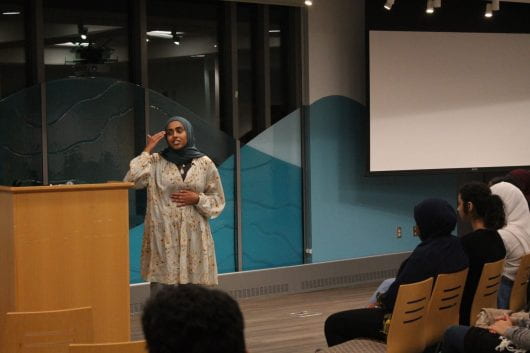
Mariam Soliman, a fourth-year in education at University of Cincinnati, performing at the Muslim Students’ Association’s first-ever Poetry Slam Nov. 1. Credit: Joseph Schmittgen | Lantern Reporter
Students congregated in the Ohio Union Interfaith Room Friday evening for the Muslim Students’ Association’s first-ever open mic Poetry Slam Night, offering muslim students the opportunity to show off their spoken-word skills.
The event featured performances from nine students, who received votes from their peers for favorite poems at the end. The top three students were awarded prizes, with first place earning $75, a student organization T-shirt and a spot to perform at the Muslim Students’ Association’s annual benefit dinner, one of its biggest events of the semester.
“In Islam, we have this tradition of poetry that is used in ways to educate, to teach people about what Islam is, especially directed towards young children,” Abdul Karim Kaba, a fifth-year in biology and Male Education Chair of the Muslim Students’ Association, said.
Kaba said the inspiration for putting on the Poetry Slam Night for the first time came when members noticed the large amount of aspiring poets within the group. They thought adding the competition aspect would bring in a larger crowd, as well as ignite an inspirational fire among the poets.
Mohamed Warsame, a fourth-year in computer science, won first place for his poem, “Growing Pains,” in which he spoke about the struggles of growing up as a Somali immigrant in Columbus, Ohio.
“It’s about growing up in the inner-city and some of the struggles my immigrant mother had to go through to get us where we are right now and not looking back into any of the things that hold you back in society,” Warsame said.
The evening featured a variety of poets who touched on topics such as struggling with identity, converting to Islam and dealing with the daily stresses of being a student.
Mariam Soliman, a fourth-year in education at University of Cincinnati, moved the crowd with a bold performance that earned her second place, as she spoke on her experience as a Muslim-Egyptian-American and incorporated the Arabic language into the poem to drive home her message.
“It encourages people to share their stories, as well,” Soliman said. “So it’s kind of to encourage people to speak about themselves and share their perspectives.”
She said a lot of her work was inspired by her time living in in Egypt, where she saw the protests of the Arab Spring — a series of protests and political uprisings leading to the resignation of former President of Egypt, Hosni Mubarak.
“A lot of that had to do with young people demonstrating in the streets to end the regime,” Soliman said. “That resonated with me a lot and was the topic of my college essays because it really influenced me as a person and told me you could speak out and create change in a government or inspire that in people.”
Editor’s note: This story was changed to reflect that Mariam Soliman is a student at University of Cincinnati.


